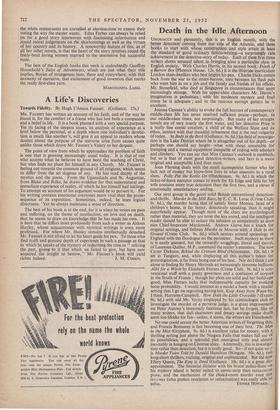Death in the Idle Afternoon
UNUSUALLY and pleasantly, this is an English month, with the better detection' coining from our side of the Atlantic, and three
books to start with whose construction. and style attain at least
the- Standard of good brdinary fiction-writing—,a surprisingly rare achievement' in the detective-story of today. Each of these first three writers shows unusual talent in .bringing.alive a particular class in English society. With Charles Harris, in his second book, Diath of a Barrow Boy (Phoenix House. 12s. 6d.) it is the illiterate inarticulate London slum-dwellers who best inspire his pen. Charlie Hicks comes back from the war to the street-barrow, torn between his flash pals who want him in on a job and the family and friends of his officer, Mr. Stonefield, who died at Singapore in circumstances that seem increasingly strange. With his upper-class characters Mr. HarrisN imagination is pedestrian,; with his moderate mystery and final Crime he is adequate ; and in the raucous corrupt gutters he is excellent.
Joanna Cannan's ability to evoke the full horrors of contemporary middle-class life has never received sufficient praise—perhaps, in our middle-class times, not surprisingly. But many of her straight novels are of very nearly the first water, and her detective Price is a really fine comic creation, a child of the Welfare State and its ethos, instinct with that dreadful refinement that is the real vulgarity of today, In Body in the Beck (Gollancz. 9s. 6d.) his field of investiga- tion is the Lake District where he is altogether out' of his depth—or Perhaps one should say height—what with shoes unsuitable for tramping and a mental equipment incapable of coping with scholars and climbers. You can say that Miss Cannan's outlook is snobbish, but so is that of most good detective-writers, and hers is a more original and acceptable kind than most.
Joan Fleming deals with the small incompetent farmer who for lack not of money but know-how lives in what amounts to a rural slum. Polly Put the Kettle On'(Hutehinson. 9s. 6d.) in which the ticket-of-leave narrator comes to work for Eli Edge and falls for his wife contains more true detection than the first two, and a clever if
emotionally unsatisfactory ending.. ,
Our next group is the good 'solid British conventional detection- and-thrills. Murder in the Mill Race, by E. C. R. Lorac (Crime Club. 9s. 6d.), the murder being that of saintly Sister Monica, head of a children's home, is far better, detectively speaking, than it might superficially appear. Though most of the clues are psychological rather than material, they are none the less sound, and the intelligent reader should be able to induce the solution as competently as does nice Chief-Inspector Macdonald. Andrew Garve has a knack for original settings, and follows Murder in Moscow with A Hole in the Ground (Crime Club. 9s. 6d.) which centres around speleology in England with the Dordogne on the perimeter. Such mystery as there is is easily guessed, but the cowardly wrigglings, literal and moral, of Laurence Quilter, M.P., command the reader's attention. The new Carter Dickson, Behind the Crimson Blind (Heinemann. 10s. 6d.) is set in Tangiers, and, while displaying all this author's talent for prestidigitation, is far from being one of his best. Nor do I think I am alone in finding Sir Henry Merivale an increasingly tiresome buffoon. Alibi for a Witch by Elizabeth Ferrars (Crime Club. 9s. 6d.) is con- ventional stuff with a pretty governess and a confusion of corpses
in the South of France ; though her plots are solid and her build-ups good, Miss Ferrars lacks that indispensable capacity for evoking tense probability. I would instance as a model a book with a similar
setting that I go on regretting having lost, Keep Away from Water by, I think, Harriette Campbell. How Doth the Little Crocodile ? (Evans.
9s. 6d.) with old Mr. Verity employed by his criminologist club to investigate the murder of a perverse judge, is a great improvement on Peter Antony's tiresomely facetious last, but he forgets, like so many writers, that dull characters and dreary settings make death
seem too lifelike for fun—unless, it seems, the writers are Frenchmen. No one could accuse the better American writers of forgetting this, and Francis Bonnamy is fast becoming one of their best. The Man in the Mist (Gryphon. 9s. 6d.) is excellent value for money, with a..
thrilling setting just above the Niagara Falls that makes full use of its possibilities, and a splendid plot unoriginal only and almost
inevitably in hanging on Commie spies, Admittedly, this is investiga- tion rather than detection, but it is really good. So—if not quite so-- is Murder Twice Told by Donald Hamilton (Wingate. 10s. 6d,), two
long-short thrillers, exciting, original and sophisticated. But th6 new
Ellery Queen, The King is Dead tGollancz. 10s. 6d.) is a great dis- appointment. The financial dictator with his brutal policy-State uR
his mystery island is better suited to comic-strip than consecutive prose, and the mechanism of the closed-room murder even this rev,mer (who prefers revelation to ratiocination) was easily able to










































































 Previous page
Previous page